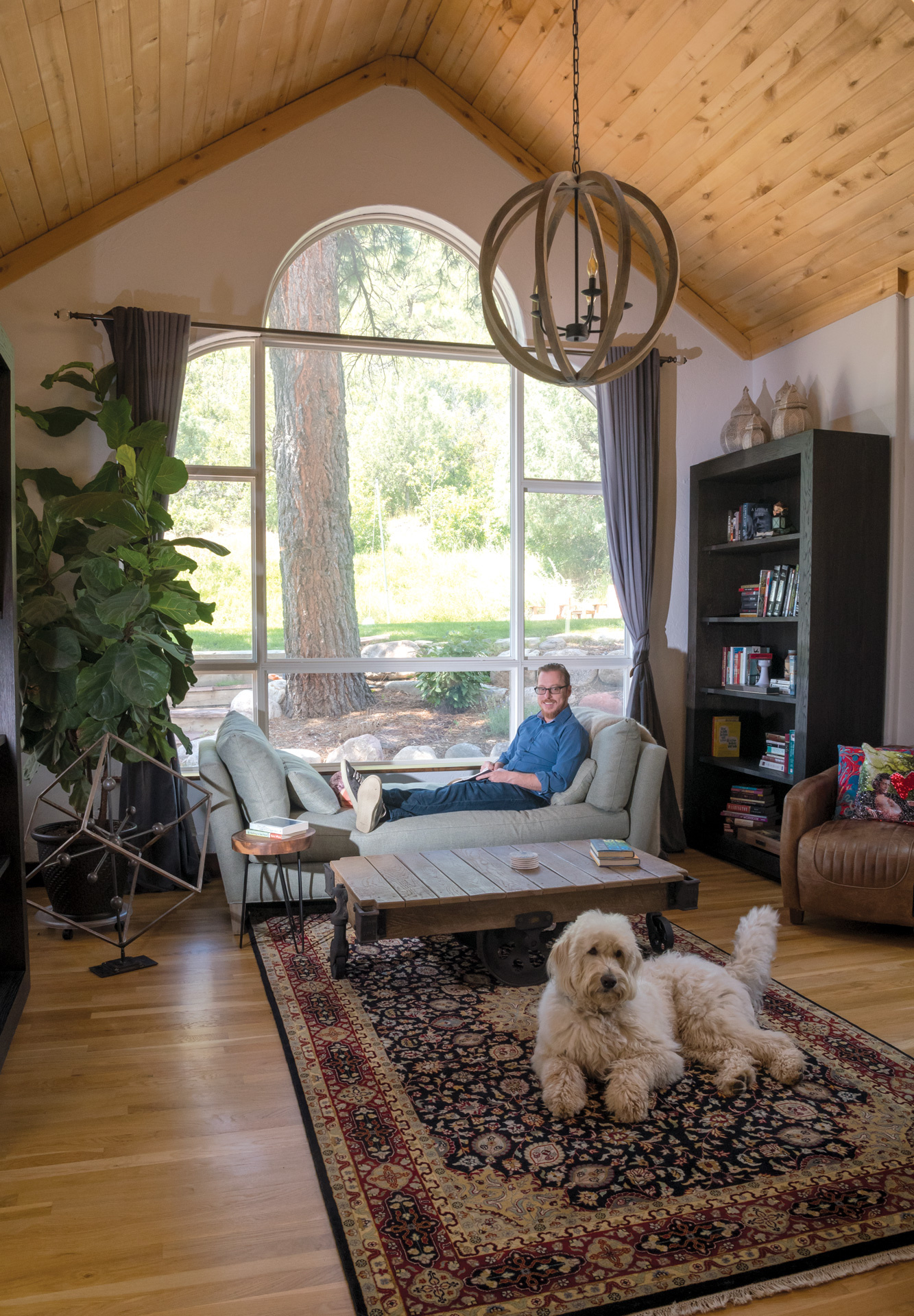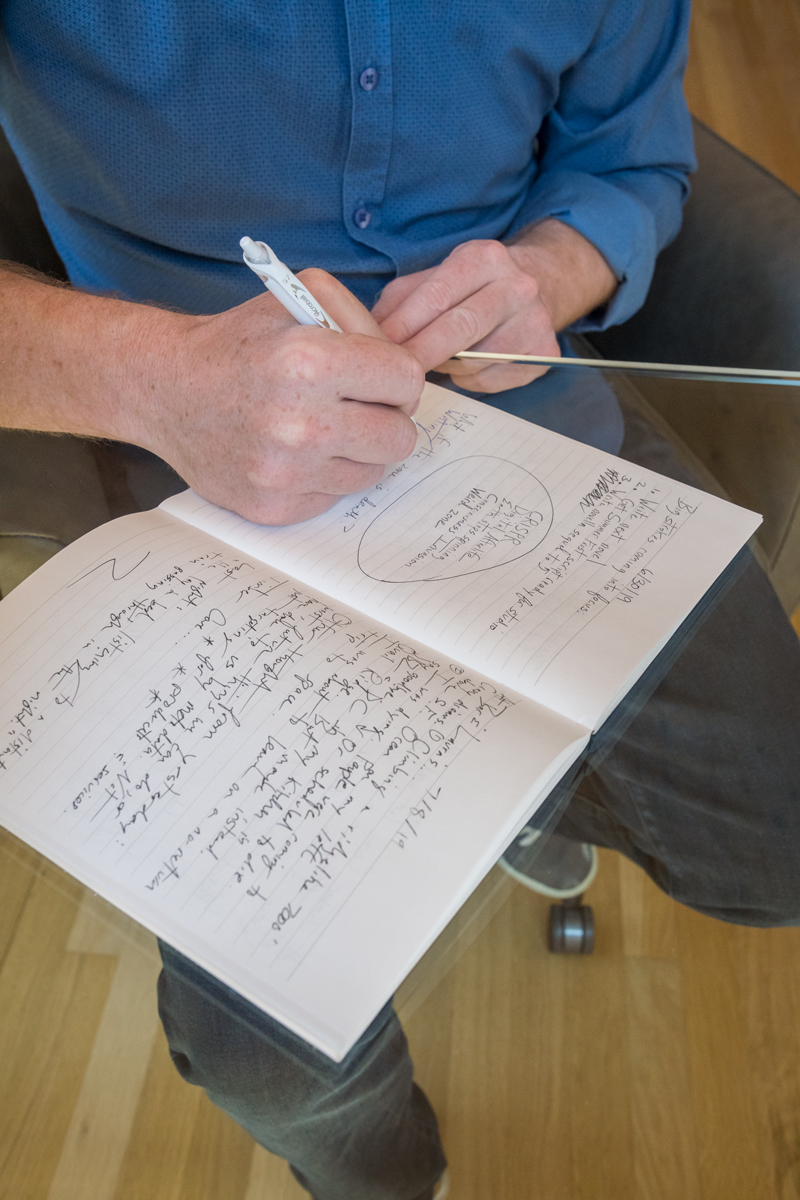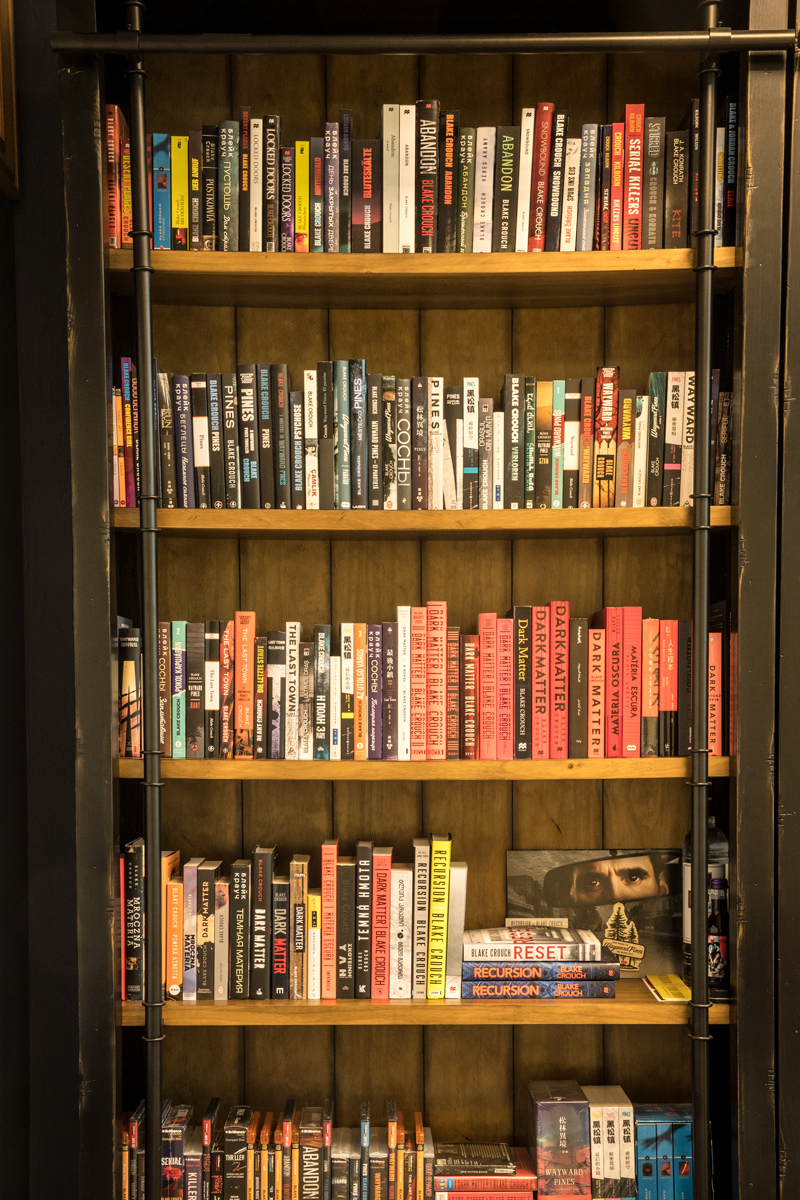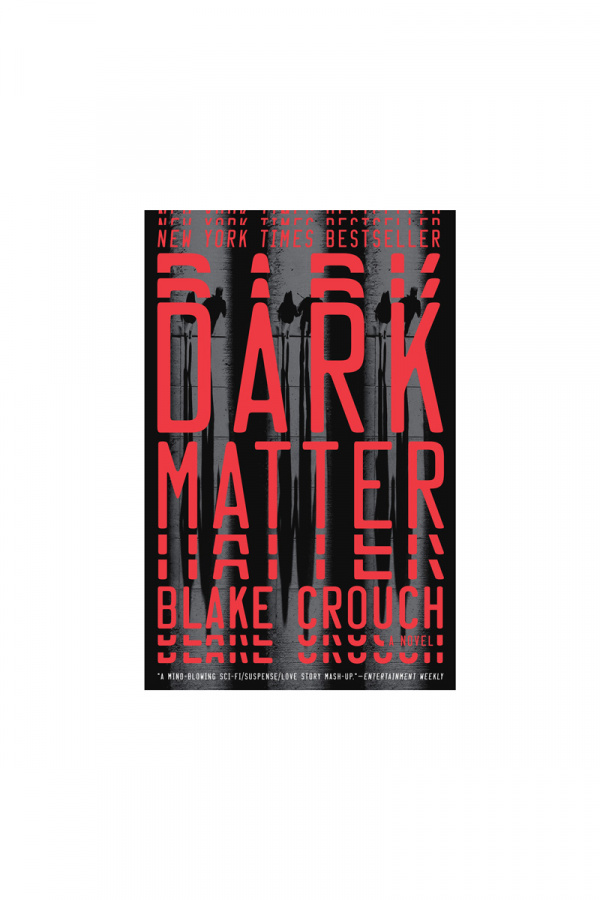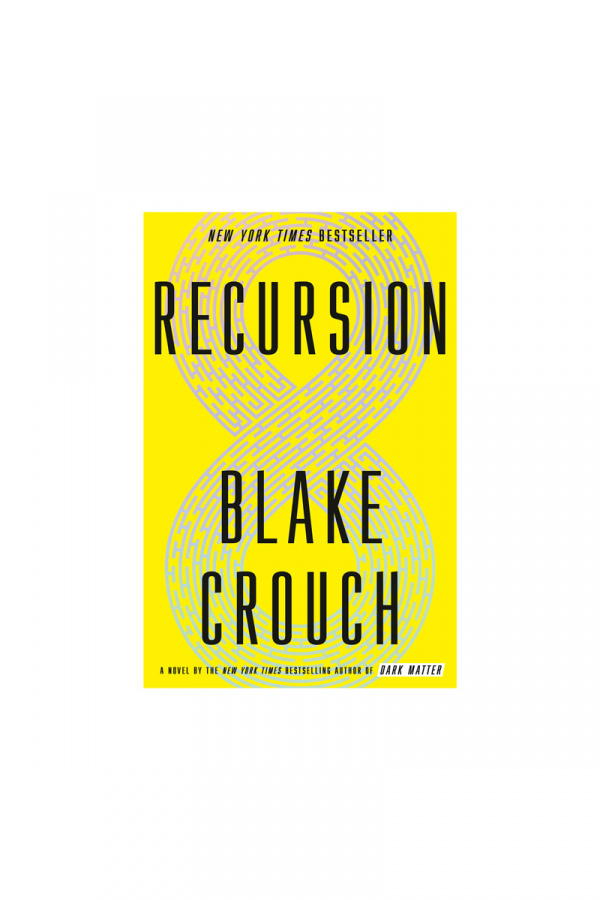This interview was originally published November 6, 2019, for Sixtysix magazine. Blake Crouch’s Dark Matter has been adapted for AppleTV+, with the first two episodes to drop May 8, 2024.
Peek at any one of the dozens of journals inside Blake Crouch’s Durango, Colorado home, and he may seem a bit peculiar.
That’s where genius ideas for his thrilling works of science fiction are born, in drawings and scribbles on ruled paper, like “4th dimension = length + width + depth + duration (time)” and “Wormholes are dimensional?” It was scribbles like these, made in 2014, that paved the way for Recursion, the 2019 science fiction novel that was so exciting it was picked up by Netflix before the book even hit shelves. A story of memories saved, changed, and manipulated, it’s the toughest book Blake says he’s written yet.
When we caught up with Blake in late August, he was relaxing between books, spending his days playing outside with his three kids, hiking with his dog BoJack, and trying to figure out what his next novel would look like. He’s had what he calls a serpentine writing career, from his first novel published in 2004 to moments of doubt in the late 2000s to recent successes like Wayward Pines (adapted for Fox with episodes airing from 2015–16), Dark Matter (currently in development with Sony), and now Recursion.

Blake lives and works in Durango, Colorado. Photo by Kennan Harvey
I just finished Recursion. It’s incredible. What inspired you to tell this story?
Recursion was a really weird process. It was not the first thing I did after Dark Matter. I started writing another book pretty soon after Dark Matter was published. I got about 150 or 60 pages into it, and I didn’t feel like I quite had my arms around the technology; it had to do with artificial intelligence in the video gaming world, and while there was a lot of stuff I loved about it, I didn’t think I had a full grasp of where it was going and where I wanted to take it. I set it aside and I was sort of looking at the blank page and going through my journals, which is something I do in between books—I take a lot of notes on possible story ideas, characters, and science. So I’m going through all my journals and I kept coming back to this obsession with memory, with how much memories define us, not just our identity but how we interact with others, how we see reality. I kept feeling this strong attraction to memory as a central concept. I started going through my process, which is spending a lot of time going through articles and seeing what the latest breakthroughs have been, and I found this article in the Smithsonian that was describing this experiment a couple of MIT neuroscientists completed in 2010. They were digging into the idea of implanting false memories in the brains of mice. They slid these little electrodes through their skulls and, by firing certain neurons in a mouse, they convinced it that it had been electrically shocked, even though it had never happened. I thought, “Wow that’s really cool. What if we were to scale that up and do this with humans? What are the ramifications of that?” This set me off down this path of writing this book.
How long was that process? How long were you working on Recursion?
I started Recursion in February 2017. I threw more pages out on this book than anything else I’ve ever written. It’s just a really complicated story line. I went down a lot of blind alleys before I figured out what the end was. I think I had a first draft done in December 2017 and then another eight months of massive rewriting before I really finished the book in late July 2018. A good year-and-a-half from initial idea to turning it into Recursion. But of course there’s stuff in my life that led me to writing this book that goes decades back, so in some ways I’ve been working on this book my whole life.
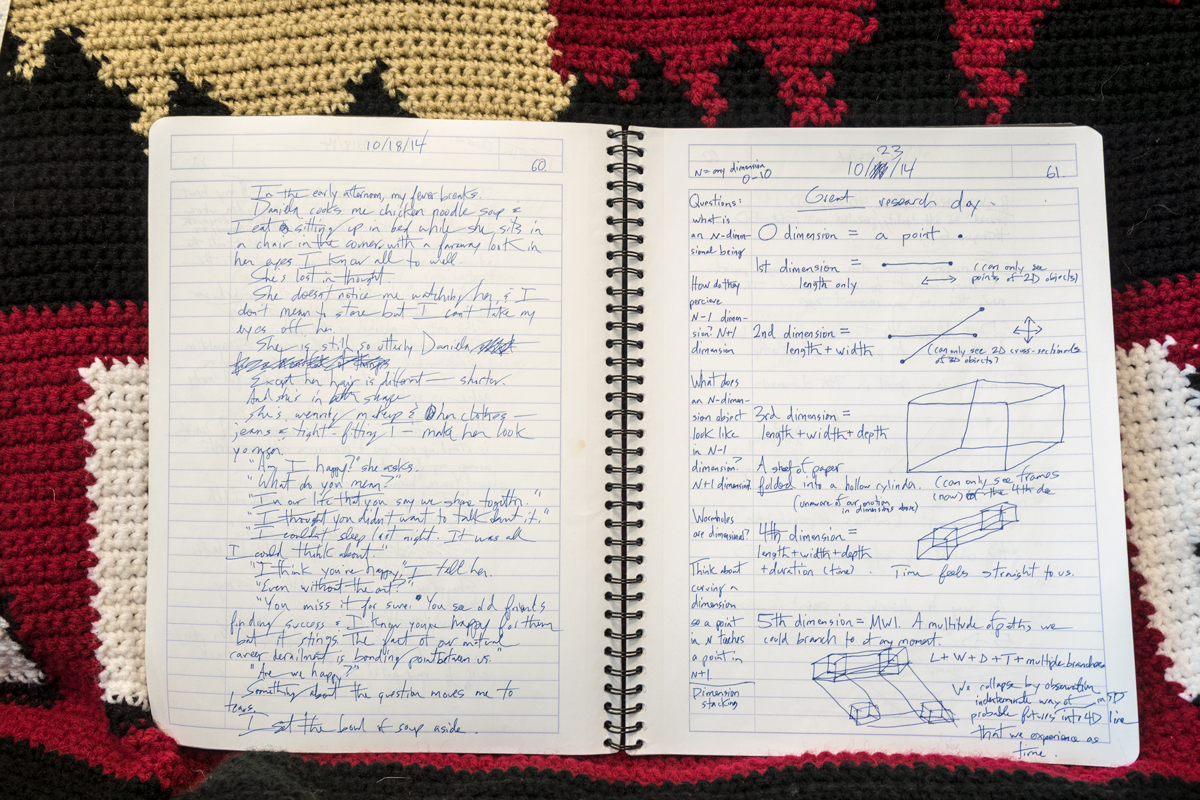
Blake can write anywhere—in his home office, his town office, on his deck, at the kitchen island, or, frequently, on planes. When he’s in his downtown Durango office, he uses a whiteboard to map out story structure. Other times, he jots ideas in notebooks. “You never know when you write something down and don’t really know what it means, but something in your psyche is connected to it and five years later you may go back and read through these journals, which I do frequently, and you suddenly see an idea in a new light. Dark Matter had two or three journals, Recursion had a couple, and I have probably 20 journals all told.” Photo by Kennan Harvey
How so? Can you give me an example?
Well, like the whole idea of Helena, the neuroscientist co-protagonist of the book. She’s essentially building this memory chair to capture and save core memories because she’s trying to save her mother’s core memories. Her mom has Alzheimer’s. When I was 8 years old my grandfather came to live with us for about six weeks. He was not able to care for himself, and my mom and dad had gotten a care facility for him, but it wasn’t available for six weeks so he lived with us during that time. It was tragic and scary and fascinating and all these things, living with someone whose memories were completely abandoning them. I remember waking up in the middle of one night and he was shuffling around in my closet at 3am. He thought he was getting on a train. All of that made a big impression on me.
Related | Emily St. John Mandel on Working Through Chaos
There are a lot of flashbulb memories that made their way into Recursion. A flashbulb memory is a memory that surrounds an event that is so formative in our identity that we always remember it with incredible clarity, as opposed to most memories, which we remember but the clarity of them is in question. Like 9/11—everyone who was there has a flashbulb memory around that for the most part, or the Challenger. There is this character [in Recursion] who talks about being in the dentist’s office when the Challenger exploded in 1986; I lifted that straight from my own experience of seeing the Challenger explode in 1986 sitting in the waiting room of the dentist’s office. That exact memory is my flashbulb memory.
Let’s back up to how you got here. How did you get your first book deal?
Whew. It was awhile ago. I got my first book deal in 2001, for Desert Places; it was with St. Martin’s Press. I got an agent with a query letter and then she read the manuscripts and took it on. It took eight months to sell the book. My writing career has been really pretty serpentine. From 2004 to 2010 I was traditionally published with St. Martin’s Press. My sales were never great at St. Martin’s, they were kind of diminishing, and basically I thought my career was dead or dying. And then the Kindle came along and the ability to publish on not just Kindle but on the Nook and Kobo and Smashwords. I got the rights back to some of my early novels and released those on the e-book platforms and published one new book, Run, in 2011. I saw a rate of sales I’d never seen before with St. Martin’s Press. At this point in time Amazon Publishing came into being, which is different from the self-publishing Kindle direct platform; this is a national publisher. I had come up with my Wayward Pines idea, and so Amazon Publishing published Wayward Pines and then I sold the show and that kind of exploded. After I finished Wayward Pines I was ready to go back to traditional publishing … I wanted to have the full suite of options available so I moved with Dark Matter to Penguin Random House, who just published Recursion. Really, it’s hard for me to say, “Just get an agent and do these things.” My career has been sort of reacting to the changing market of publishing.
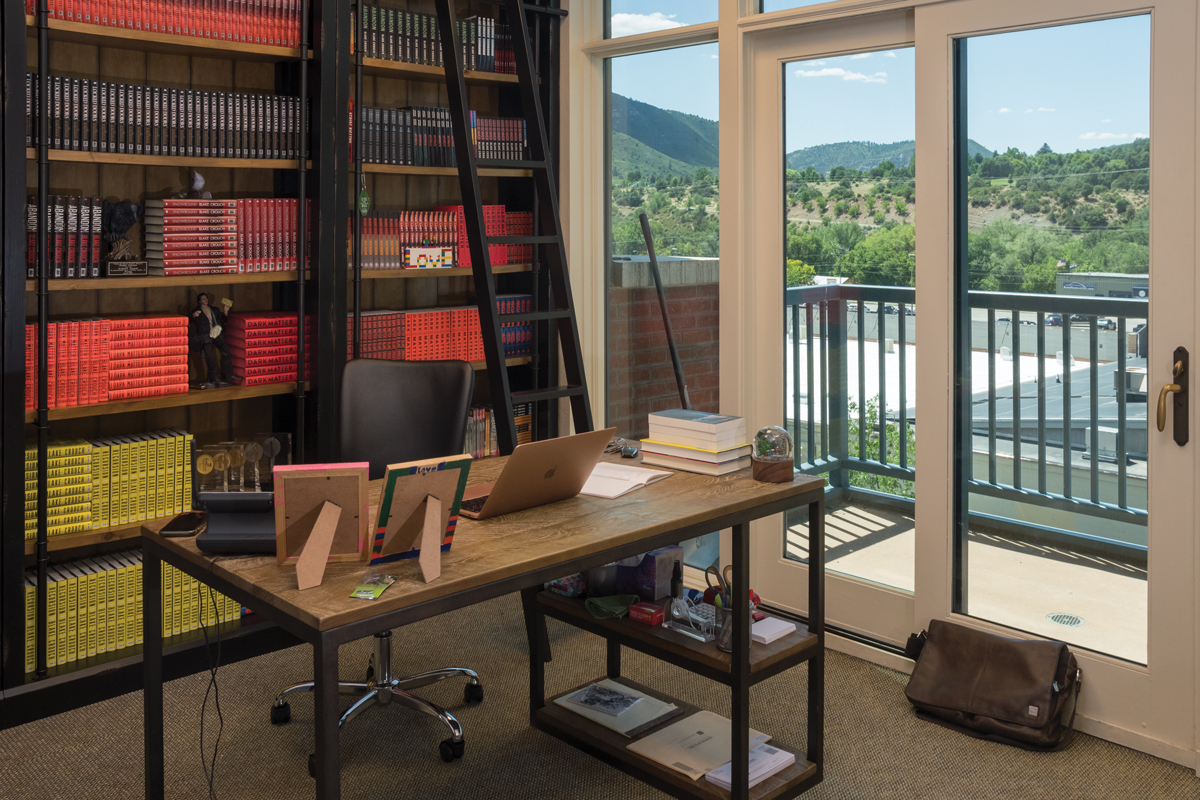
Blake’s bookshelf is filled with familiar book jackets and memorabilia from his writing turned TV in his downtown office. Photo by Kennan Harvey
How did you first begin working with TV and film?
We mailed Pines out to a few producers and there was a lot of interest, and one of them was a guy named Donald De Line. He put me in touch with this writer/showrunner named Chad Hodge, and we got on the phone and had this great conversation. He really loved the book and had a real confidence and vision for how it could become a TV show—and not just how it could become a TV show but how to sell it. He thought, wisely and correctly, that it was way too complicated just to try to pitch this to someone. He wanted to write the pilot, so I let him take a pilot script out as the selling tool; he wrote such a great script they were able to get M. Night Shyamalan to sign on to executive produce and direct the first episode; it was just one of those amazing things where everyone kept saying yes—from the studios to the actors we wanted to get on board. It was a pretty amazing process.
Did you ever imagine this becoming your life?
I guess I hoped I would find success in film and television. I never thought it would be to this extent. You don’t realize until something’s been made how hard it is—it’s not easy to option something, but it’s really not that hard to sell something as an option and to get it into development at a studio. What’s really, really, really hard is the next step, which is to have a studio produce a pilot. I didn’t realize at the time how difficult that was and how fortunate I was to have Wayward Pines and Good Behavior (TNT) both not only be produced but get on the air and be pretty well received. I’ve had plenty of friends who’ve had things made and made badly. That does not help anyone’s career to have something be poorly made. I feel incredibly fortunate.
Has having your work adapted for film or TV changed the way you write?
I’m sure it has, but it’s not been intentional. Obviously I’m aware I can write a novel and it can be its own thing and that it can potentially have a life outside of being a book, that it could go on to be a script or a movie or a TV show, but I didn’t try to ever write anything just thinking, “Oh, this will be a movie or a great TV show.” If I thought that I would just write the movie or TV show. There’s always room for it to become a film and someone write a script based on it.
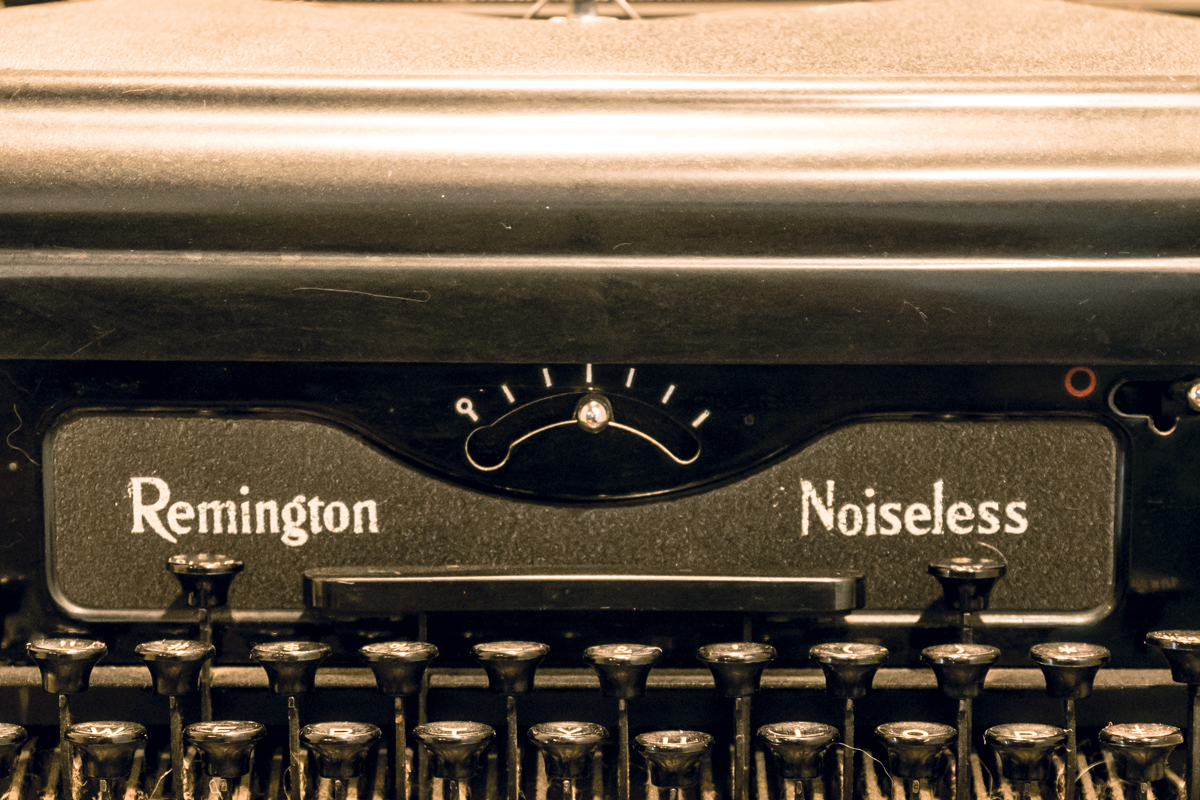
Blake’s novella Summer Frost was just released as part of the Amazon Original Stories Forward collection. He curated the short story collection with his partner and, for Summer Frost, used parts of the novel he abandoned between Dark Matter and Recursion. “It’s a pretty cool lineup of writers [N. K. Jemisin, Veronica Roth, Amor Towles, Paul Tremblay, and Andy Weir] all involved in that collection.” Photo by Kennan Harvey
Did you always want to be a writer? What were you like as a kid?
From probably 6 or 7 years old I wanted to be a writer. It was always a question of, well, being a writer is not something I would encourage one of my kids to pursue seriously. If you want to be a writer great, but you should probably have other skill sets to fall back on because it’s a really hard business and tough to maintain any real level of control unless you get to a certain place of success. But yeah, it’s what I always wanted to do. I started my very first novel, unpublished, in high school my senior year. I wrote short stories throughout high school and middle school. I told my brother scary bedtime stories. I was 10 and he was 4. I wrote a Star Wars sequel to Return of the Jedi in the early ’90s when I was grounded and couldn’t do anything else, but my parents would let me write on our Tandy 1000 if I wanted. It’s always been the thing I wanted to do and the only thing I could do well.
Are you pretty deliberate about how often you write or do you just write when things come to you?
No. When I know what my book is and I have a plan or when I’m writing a script and know what I’m doing, I try to write every day. I might take Sunday off, but I’ll try to write every day because you build up momentum with each subsequent day and if you derail yourself it can be tough to get back on track. I don’t know what my next book is yet. I have a pretty good notion, but I don’t know what it is so my time right now is spent trying to envision what that story can be. Actually writing is not helpful at this stage. The helpful thing is trying to figure out what the structure of the book might be, the way in, what the characters might be.
“It’s always scary to face the blank page again and come up with the next idea.”
So you’re not locked in a room writing eight hours a day every day right now.
I know many writers and we all have our different processes. I know a lot of people who have so many book ideas and they need time to go do each of them. They finish this book and they roll right in and do the next one. I’m really not like that. I tend to be very hard on my ideas, especially lately. Dark Matter is a book that’s based around the multiverse. From one vantage point, Recursion is a novel that’s based on time travel. These are very well-known tropes. It’s not like no one’s written a multiverse book before … but I love going into these big ideas and trying to stake out my own new ground in them. It’s very hard for me to pull the trigger on starting my next book because at the end of the day I’m always like, do we really need another multiverse story? Do we really need another time travel story? Do we really need another small quirky town story? There has to be a really compelling way in for me to take that leap, which is why I’m not writing every single day. I’m trying to pressure check how strong the initial idea is.
What do you do when you’re not writing?
I have three kids, so they take up a good amount of free time. I live in this beautiful part of the country, so I get outside a lot, mountain bike and hike a lot. I take my dog into the mountains whenever I can. My partner and I travel a lot. Travel is an amazing way I’ve found to lose these creative ruts you get into. I’m inspired by places I see, and they work themselves into my books, so that takes a big priority for me.
- “In some ways I’ve been working on this book my whole life,” Blake says of “Recursion.” For every book he keeps a series of journals, but he also jots down ongoing ideas as they come to him. Photo by Kennan Harvey
- “It’s always scary to face the blank page again and come up with the next idea; it seems to always feel harder than the last time,” Blake says. Photo by Kennan Harvey
That’s so interesting. I picked up Dark Matter not realizing it was set in Chicago and I was so excited to read scenes set down the street from where I live. How did you decide to set that novel there?
I have a lot of really good friends who are Chicagoans. I have one writer friend, Marcus Sakey, and I was on a brainstorm trip to Chicago visiting him when I came up with the idea for Dark Matter in (restaurant) Longman & Eagle … That felt like my Chicago book. I honestly never really considered setting it anywhere else.
How do you feel these days sharing new work? Do you still get nervous putting your writing out there?
Every time. You never know if stuff that connects to you will connect to others. It’s always scary to face the blank page again and come up with the next idea; it seems to always feel harder than the last time. I don’t know many writers who aren’t pretty kooky about that stuff.
How do you define success?
I don’t know. I think of it as you have these milestones you hit and you enjoy it for a moment. Like the first time a publisher sends you the book they’re about to publish in a month and you hold that, that’s a success. It’s hard to ever match the first time I had an agent represent me. I had no idea how many more mountains there were to climb before I was able to be creative for a living, but that was a bar of success. The first time a publisher bought my book. The first time I hit The New York Times bestseller list. The first time I broke the top 100 on Amazon, the first time I hit #1 on Amazon, selling Wayward Pines, sitting on set and watching actors say words from a script I’d written. There are all benchmarks, but none of that matters when you’re looking at the blank page and trying to figure out what you’re going to do next. I think there should be a level of fear each time.
- Dark Matter, 2016. Photo courtesy of Blake Crouch
- Recursion, 2019. Photo courtesy of Blake Crouch
I understand Shonda Rhimes (Grey’s Anatomy), Matt Reeves (Cloverfield, The Batman), and Netflix are adapting Recursion. What’s that been like?
Honestly I’m an executive producer on that project, but Recursion was such a beast of a book to write I did not attach myself as a writer, so I’m not really in the weeds of that process yet. It’s still pretty early days, so hopefully a year from now I will have more to say, but right now I haven’t really been that involved, by my own wishes. It’s weird. Some things I want to be very intimately involved in in terms of adapting them for film or TV. It’s a weird decision when it comes time to make it because before we take something out to sell it in Hollywood I have to decide whether I want to write it and how involved I want to be. I knew with Recursion that it was such a hard book to structurally figure out; I was like I’m ready for people smarter than I am to figure out a way to bring this to the screen.
Will that be fun to watch for you or will it be stressful?
[Laughs] I hope it’s fun to watch. There are really smart people and really successful producers and writers and directors involved in the adaptation. I have high hopes.
Do you have any advice for anyone trying to navigate this world or similar creative endeavors?
For me, the real breakthrough in starting to write a story that resonates with people happened when I put more of myself into the story. Not like in an autobiographical sense but more like channeling whatever psychological stuff, emotional stuff I was going through at the time, not trying to shove that away and write something completely divorced from it, but actually channeling it. It started helping me write characters and make art that connected to far more people.
